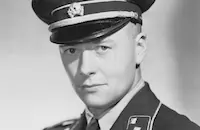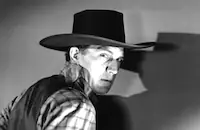Riders of the Range

Brief Synopsis
Cast & Crew
Lesley Selander
Tim Holt
Richard Martin
Jacqueline White
Reed Hadley
Robert Barrat
Film Details
Technical Specs

Synopsis
Upon arriving in Arizona, out-of-work cowboys Kansas Jones and Chito Rafferty head for the nearest saloon to see if there are any jobs in the area. There they become embroiled in a fight between saloon owner Clint Burrows and Drusilla "Dusty" Willis. Dusty, a rancher, is furious at Burrows for allowing her weak-willed brother Harry to gamble in his saloon and strikes him with her riding crop. When Burrows begins to hit back, Kansas and Chito intercede on Dusty's behalf, and out of gratitude, Dusty offers the cowboys work on her ranch. Burrows, meanwhile, confronts Harry about his $3,000 gambling debt, demanding that he pay up with Dusty's cattle by the next morning. Although Dusty has ordered Kansas and Chito to help her brother in the south flat, Harry abandons the cowhands so that he can round up cattle for Burrows, who has arranged for Ringo Kid, a notorious rustler, and Trump Dixon, his own henchman, to take the herd. As Ringo, Trump and their men descend on the cattle, however, Kansas and Chito ride up and drive off the rustlers. Harry pretends to join in the fight against the rustlers and then feigns an injury, but when Dusty arrives on the scene, she detects his ruse and chastises him. In town, meanwhile, Ringo accuses Burrows of setting him up and demands his payment. When Burrows refuses to pay, Ringo robs his safe at gunpoint and takes a billfold full of money. Angry that he has been double-crossed, Burrows goes to confront Harry, who has decided to leave the ranch for good, and is about to shoot him when Chito and Kansas interrupt. After forcing Burrows off the ranch, Kansas convinces Harry to "come clean" with Dusty and return to the ranch. Impressed by Harry's honesty, Dusty offers to pay his gambling debt and then entrusts Chito and Kansas with the money. On the road to town, the cowboys spot Ringo on his horse and, recognizing him as a rustler, chase him. Chito finally corners Ringo among some rocks, but the rustler knocks him out and flees. Later, Kansas finds Burrows' billfold in the dirt and takes it with him to town. At the saloon, Kansas and Chito buy up Harry's IOUs, an exchange witnessed by Ringo. After the cowboys leave, Ringo sneaks into Burrows' office, steals the money again and kills Burrows. Kansas and Chito are accused of the crime, but when Sheriff Cole and his posse are about to arrest them, they escape. While Chito distracts the pursuing posse, Kansas rides to town to find Trump. At gunpoint, Kansas forces Trump to take him to Ringo's remote hideout, and there Kansas engages the rustlers in a gunfight. Chito, meanwhile, has been caught by the sheriff, but the trusting Dusty connives to free him. With Chito's help, Kansas defeats the rustlers and lassos Ringo. Kansas then shows the sheriff that Ringo was carrying the stolen money and thereby vindicates himself and Chito. Although Kansas and Chito then head for Prescott to testify against Ringo, Dusty is confident that they will return soon, as Kansas has deliberately left Chito's beloved "lucky peso" with Harry.

Director
Lesley Selander
Cast

Tim Holt

Richard Martin

Jacqueline White
Reed Hadley

Robert Barrat
Robert Clarke

Tom Tyler
William Tannen
Holly Bane
Crew
C. Bakaleinikoff
Jack Barron
Orville Beckett
Emmett Bergholz
Henry Burton
John Cass
Albert S. D'agostino
Richard Davol
Feild Gray
Norman Houston
J. Roy Hunt
Charles Martin
Jack Mills
John E. Pommer
Clem Portman
Paul Sawtell
Herman Schlom
Oliver Sigurdson
Darrell Silvera
Josephine Sweeney
Robert Swink

Film Details
Technical Specs

Articles
Riders of the Range
Tag line for Riders of the Range
Tim Holt's series of well-produced B-Westerns at RKO were still going strong when he made this tale of crooked gamblers and cattle rustlers. For this outing he has a character name (in some films, the character shared the actor's name) and a pretty strong cast, including Jacqueline White, Robert Clarke and Reed Hadley. The film also marks a reunion of sorts with Tom Tyler who, like Holt, had appeared in John Ford's classic Stagecoach (1939). Although they shared no scenes in the earlier film, they have a great shootout in this outing. As a tip of the hat to the Western classic, Tyler's character is named The Ringo Kid, the same name as John Wayne's character in Stagecoach.
This time out, Holt and his sidekick, Richard Martin as the Mexican-Irish Chito Jose Gonzalez Bustamente Rafferty, come to the aid of lady rancher White, whose gambling addict brother has been helping Tyler rustle cattle to pay off his debts to saloon owner Hadley. Before long Hadley is dead, and the evidence could send Holt to the hanging tree. It takes some fancy riding and even fancier shooting (Holt was one of the best shots of any of the screen's Western stars) to save the day.
Holt was a natural for cowboy roles, being an accomplished horseman and marksman. Although he had starred in classics like The Magnificent Ambersons (1942) and The Treasure of the Sierra Madre (1948), he never treated his low-budget Westerns as slumming. He had dreamed of starring in Westerns from childhood, possibly after seeing his father, Jack Holt, star in a series of low-budget Westerns. He made dozens of films in the genre, most of them for RKO, where he was under contract from 1939 until he retired from the screen in 1952.
From Holt's return to filmmaking after World War II, Martin was his comic sidekick as self-styled ladies man Chito. One of the running gags in the films was Chito's ineptitude whenever he tried to romance the leading ladies. Martin had actually introduced the character in one of RKO's wartime action films, Bombardier (1943), starring Pat O'Brien and Randolph Scott, but would go on to play him in 29 of Holt's Westerns. Martin kept acting for a while after the end of the Holt series, but eventually retired to go into insurance sales. He and Holt remained friends the rest of their lives.
Leading lady White spent only ten years in the movie industry, playing supporting roles in A pictures and leads in Bs. She even managed to appear in two classics, Edward Dmytryk's Crossfire (1947), in which her husband is the key suspect in an anti-Semitic murder, and Richard Fleischer's The Narrow Margin (1952). She had actually retired from the screen before making that film, but was spotted by Fleischer while visiting friends in the RKO commissary and offered what would become her last film.
Clarke had already appeared in two of Holt's Westerns, Thunder Mountain and Under the Tonto Rim (both 1947), before playing White's brother in Riders of the Range. He would go on to star for Ida Lupino in Outrage (1950) and Hard, Fast and Beautiful (1951) but is probably best known for a trio of schlock classics, The Astounding She-Monster (1957), The Hideous Sun Demon (1959), which he also directed, and Edgar G. Ulmer's Beyond the Time Barrier (1960).
Hadley had played Zorro in the serial Zorro's Fighting Legion (1939) and did extensive narration because of his deep voice. He narrated George Stevens' World War II documentary The Nazi Plan (1945) and at one point had top security clearance so he could narrate training films for military personal working with nuclear weapons.
Like most of Holt's Westerns, Riders of the Range looked great despite its meager $100,000 budget. Part of the reason is clever location work. In addition to shooting on the RKO Ranch in Encino, director Lesley Selander, shot in the pine forests on the Jack Garner Ranch in the San Bernardino National Forest. The locations gave the film an unusually rich look.
Director: Lesley Selander
Producer: Herman Schlom
Screenplay: Norman Houston
Cinematography: J. Roy Hunt
Score: Paul Sawtell
Cast: Tim Holt (Kansas Jones), Richard Martin (Chito Rafferty), Jacqueline White (Dusty Willis), Reed Hadley (Clint Burrows), Robert Barrat (Sheriff Cole), Robert Clarke (Harry Willis), Tom Tyler (The Ringo Kid)
By Frank Miller

Riders of the Range
Quotes
Trivia
Notes
The working title of the film was Arizona Ambush. The Variety review incorrectly lists Tom Tyler's character name as "Kid Ringo." According to modern sources, the picture lost $50,000 at the box office.














